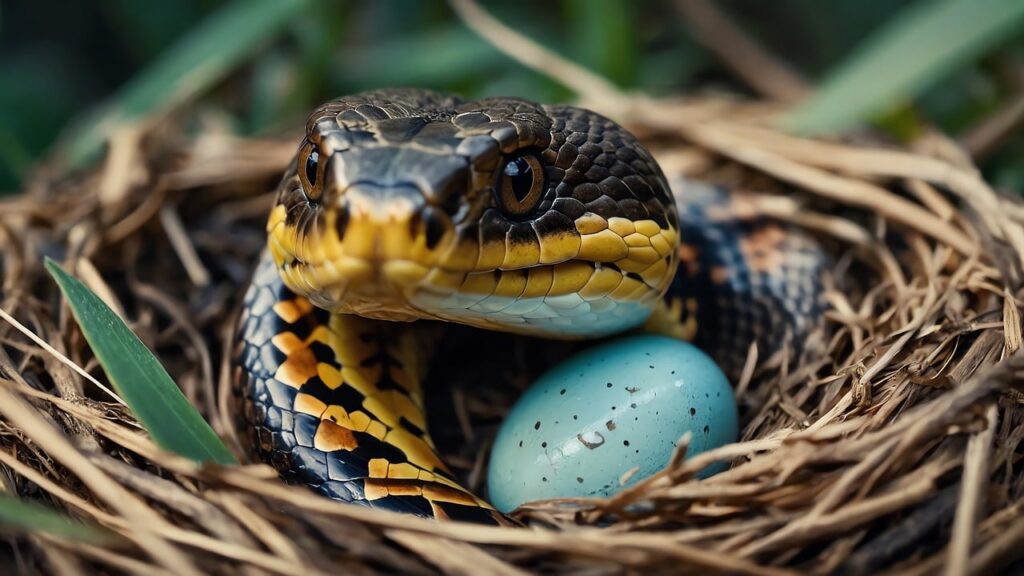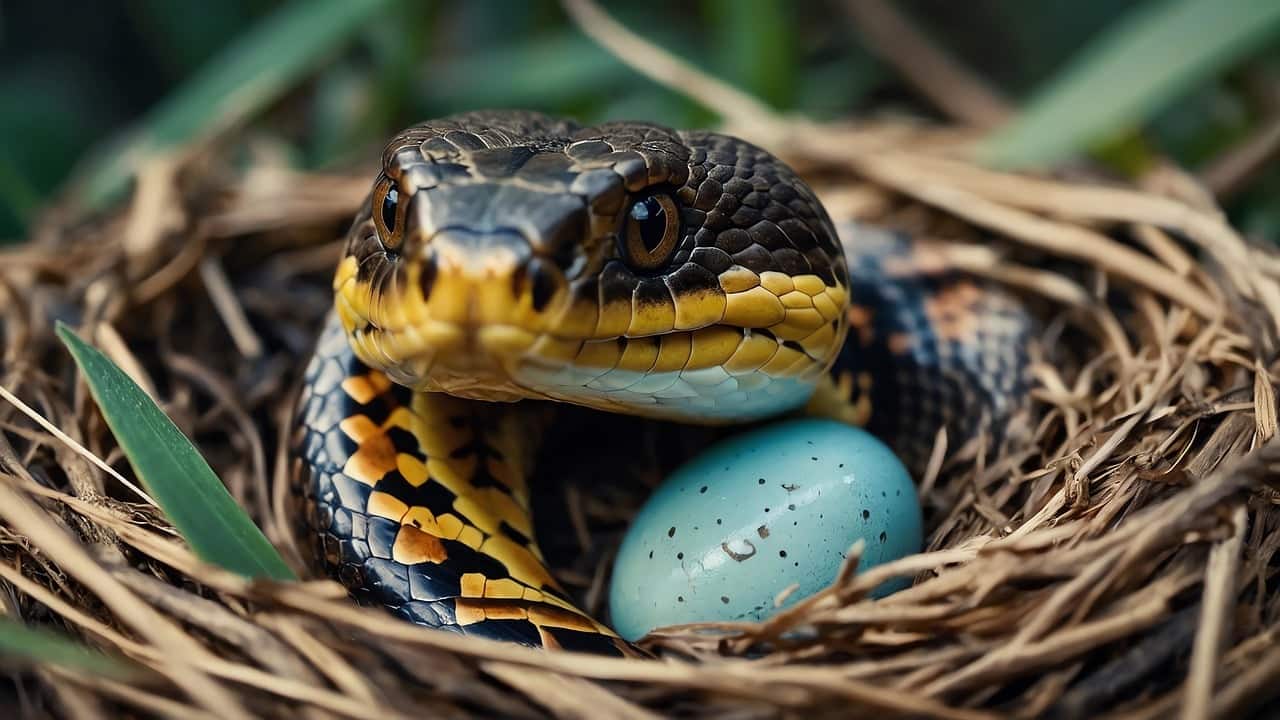Snake eggs is a fascinating process that requires careful attention to detail. Different species of snakes have varied incubation periods, and factors like temperature and humidity play a crucial role in determining how long it takes for the eggs to hatch. Understanding these factors and providing the optimal conditions can significantly improve the chances of successful hatching.

Key Takeaways
- Snake egg incubation periods vary by species, typically ranging from 45 to 70 days.
- Temperature and humidity are critical factors that influence the incubation time and success rate.
- Regularly turning the eggs helps prevent embryos from sticking to the shell and ensures proper development.
- Signs like pipping, where the snake uses its egg tooth to break the shell, indicate that hatching is imminent.
- Monitoring and maintaining optimal conditions can prevent common incubation problems and improve hatchling survival rates.
Factors Influencing Snake Egg Incubation Time
Temperature and Humidity
Temperature and humidity play a crucial role in the incubation of snake eggs. Development is faster when temperatures are at the higher end of the range. However, high temperatures can also increase the chances of abnormalities and even lethal conditions. Most snake eggs hatch in 45 to 70 days, but some species may take months.
Species-Specific Variations
Each snake species has different incubation periods. For example:
- Ball Python: 55-60 days
- Corn Snake: 60-65 days
- King Snake: 50-55 days
It’s important to research the specific incubation duration for the snake species you are breeding to ensure the best results.
Predation and Environmental Threats
Predation and environmental threats can also impact the incubation time of snake eggs. Some species, like pythons, brood their eggs by coiling around them to regulate temperature and humidity. This behavior helps protect the eggs from predators and environmental hazards, ensuring a safer incubation period.
Incubation Periods for Common Snake Species
Ball Python
Ball Python eggs typically take 55-60 days to hatch. It’s important to maintain the right conditions to ensure healthy development.
Corn Snake
Corn Snake eggs usually hatch in 60-65 days. Keeping a close eye on temperature and humidity can help achieve the best results.
King Snake
King Snake eggs generally require 50-55 days to hatch. Proper care and monitoring are essential for successful incubation.
On average, temperate-zone reptiles have incubations or pregnancies of 8–12 weeks. Tropical species tend to have similar incubation periods; however, specific times can vary.
Optimal Conditions for Incubating Snake Eggs
Ensuring the right conditions for incubating snake eggs is crucial for the health and development of the embryos. By maintaining the correct temperature and humidity levels, you are giving the eggs the best chance to hatch successfully.
Stages of Snake Egg Development
Embryo Development
During the early development stage, the snake embryo gets its nutrition from a large yolk, which it is attached to by an umbilical cord. As the fetus grows, the yolk shrinks and sinks, positioning the young snake on top of the egg. This process is crucial for the young snake’s early development and growth.
Pipping and Hatching
When the snake is ready to hatch, it uses a special tool called the egg tooth to break through the eggshell. This stage is known as pipping. The young snake will make a small hole and gradually enlarge it until it can fully emerge from the egg.
Post-Hatching Care
After hatching, the young snakes need a safe and warm environment to thrive. It’s important to monitor their health and provide appropriate food and water. Proper post-hatching care ensures the young snakes grow strong and healthy.
Ensuring the right conditions during each stage of development can significantly increase the chances of successful hatching.
Challenges and Risks During Incubation
Temperature Fluctuations
Maintaining the right temperature is crucial for snake egg incubation. Fluctuations in temperature can harm the developing embryos. It’s important to regularly check and adjust the temperature to keep it stable. If the temperature gets too high or too low, the snake eggs would die or develop deformities.
Egg Handling and Turning
Handling and turning the eggs improperly can also pose risks. Eggs need to be turned carefully to ensure even development. Rough handling can damage the embryos inside. Always handle the eggs gently and follow proper turning practices.
Common Incubation Problems
Several common problems can arise during incubation, such as mold or bacterial growth. If you notice mold or a foul odor, remove the infected eggs immediately and clean the container. Also, if eggs appear to be collapsing or dehydrated, increase the humidity levels by misting the eggs lightly or adding a damp substrate.
Ensuring optimal conditions during incubation is key to the successful hatching of snake eggs. Regular monitoring and prompt action can help mitigate many of these challenges.
How to Identify When Snake Eggs Are Ready to Hatch
Signs of Imminent Hatching
Being aware of signs like pipping, cracks in eggs, and hatchling noises can help you determine when hatching is imminent. Look for small slits or cracks on the eggshells, which indicate that the baby snakes are starting to break through. You might also hear faint noises from inside the eggs as the hatchlings begin to move.
Monitoring Egg Development
Regularly check the eggs for any changes. Candling, or shining a light through the egg, can help you see the embryo’s development. As hatching time approaches, the embryos will become more active, and you may notice increased movement within the eggs.
Assisting Hatchlings
If some eggs haven’t hatched within 48 hours of the first one, you might need to assist. However, be cautious, as slitting the shell can harm the hatchling. Seek help from an experienced breeder or vet if necessary. Leave the snakes in the incubator until they have completely emerged from their shells.
Conclusion
In summary, the time it takes for snake eggs to hatch can vary widely depending on the species and incubation conditions. Generally, most snake eggs hatch within 45 to 70 days, but some species may take longer. Factors like temperature and humidity play a crucial role in the development of the embryos. It’s important to maintain optimal conditions to ensure healthy hatchlings. Understanding the specific needs of the snake species you are breeding will help you achieve the best results. With proper care and attention, you can successfully hatch snake eggs and witness the fascinating process of new life emerging.
Frequently Asked Questions
What is the ideal temperature for incubating snake eggs?
The ideal temperature varies by species. For Ball Pythons, it’s about 90°F. Corn Snakes do well at around 82°F, and King Snakes prefer about 80°F.
How long does it take for snake eggs to hatch?
It depends on the species. Ball Python eggs take about 55-60 days, Corn Snake eggs take 60-65 days, and King Snake eggs take 50-55 days.
Do snake eggs need to be turned during incubation?
Yes, turning the eggs regularly helps prevent the embryos from sticking to the shell and ensures proper development.
What are the signs that snake eggs are about to hatch?
Signs include the eggs becoming softer, the snake embryos moving inside, and the appearance of slits or pips on the eggshell.
Can I help a snake hatch from its egg?
It’s best to let the snake hatch on its own. If you think there’s a problem, consult an experienced breeder or a vet.
What should I do after the snake hatches?
Leave the hatchlings in the incubator until they are completely out of their shells. Then, house them separately to prevent any aggressive behavior.
